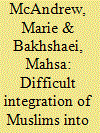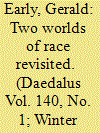| Srl | Item |
| 1 |
ID:
121231


|
|
|
|
|
| Publication |
2012.
|
| Summary/Abstract |
In countries of immigration it is often assumed, and sometimes quite clearly
demonstrated, that the events of 11 September 2001 and their aftermath had
a negative impact on ethnic relations, especially with regard to the perception
and treatment of Muslims, who often represent a significant minority
population, particularly in Europe. Most analysts agree, though, that these
phenomena were not created by the post-9/11 wave of islamophobia, but
thrived on the fertile ground of a problematic historical relationship with the Muslim world, which dates back to the Crusades and was nourished by
colonialism.1
|
|
|
|
|
|
|
|
|
|
|
|
|
|
|
|
| 2 |
ID:
102116


|
|
|
|
|
| Publication |
2011.
|
| Summary/Abstract |
Nearly fifty years ago, the American Academy organized a conference and two issues of its journal Dcedalus on the topic of "The Negro American." The project engaged top intellectuals and policy-makers around the conflicts and limitations of mid-1960s liberalism in dealing with race. Specifically they grappled with the persistent question of how to integrate a forced-worker population that had been needed but that was socially undesirable once its original purpose no longer existed. Today racism has been discredited as an idea and legally sanctioned segregation belongs to the past, yet the question the conference participants explored - in essence, how to make the unwanted wanted - still remains. Recent political developments and anticipated demographic shifts, however, have recast the terms of the debate. Gerald Early, guest editor for the present volume, uses Barack Obama's election to the presidency as a pretext for returning to the central question of "The Negro American" project and, in turn, asking how white liberalism will fare in the context of a growing minority population in the United States. Placing his observations alongside those made by John Hope Franklin in 1965, Early positions his essay, and this issue overall, as a meditation on how far we have come in America to reach "the age of Obama" and at the same time how far we have to go before we can overcome "the two worlds of race."
|
|
|
|
|
|
|
|
|
|
|
|
|
|
|
|